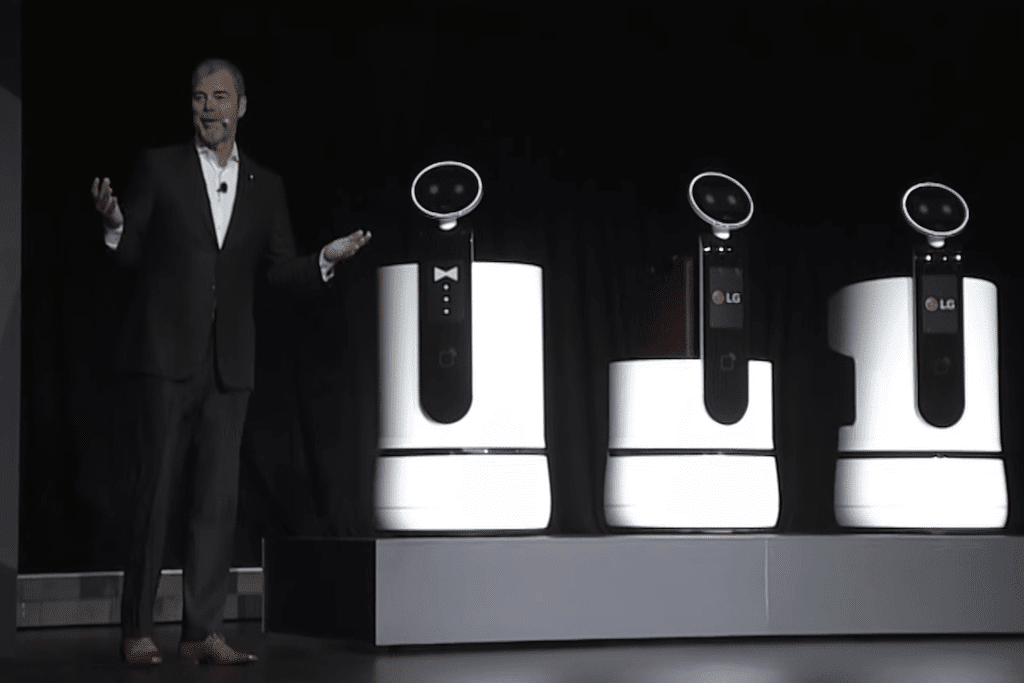For years, technology companies have been looking to disrupt the hospitality space with robotics technology that can replace human workers for tasks like carting luggage to a guest’s room or taking linens to the laundry room.
At this year’s CES 2018 event in Las Vegas, there were many examples of robots with the potential to disrupt the travel and hospitality sectors. None of them seem remotely close, however, to making a real impact.
Perhaps the most high-profile hospitality play came South Korean technology company LG, which featured in a press conference a series of robots aimed at disrupting hospitality. The company first showed off its Cloi robot onstage to disastrous results; the device wouldn’t respond to David VanderWaal, LG’s head of marketing in the U.S., leading him to joke that Cloi doesn’t like him.
While Cloi is aimed at the consumer market, it’s easy to see how similar technology could end up at hotel front desks. In person on the show floor, the device seemed cute even though viewers couldn’t interact with it using voice commands.
LG also showed off three other robots that are aimed squarely at hospitality: a Porter Robot, which can bring a guests’ bags to their room; a Serving Robot, to brings food and drinks to guests at a restaurant or lounge, and a Shopping Cart Robot, which can scan items and carry them along.
All of these prototypes, however, are just different versions of a bin with wheels. It’s hard to see how hotels brands with a strong focus on guest experience and service would embrace these devices. It’s also unclear how these devices would play with a hotel’s technology systems. How would the Porter Robot, for instance, interface with a hotel’s housekeeping systems?
In the Eureka Park section of the CES show floor, which is focused primarily on startup innovation, there were many other examples of robots geared primarily toward consumers.
Buddy the Robot, a sort of tablet on wheels with an adorable expression, seems like it would make sense for brands like Yotel to experiment with in a lounge or lobby environment (it rolled up to this reporter on it’s own, smiled, and told me it was a big boy, which is not exactly true).
There were also a variety of either tablets with arms geared for customer service, or rolling robots equipped with iPads. None seemed particularly groundbreaking, and most were more than a little creepy.
Smart luggage was also on display across the event, with suitcases that use cameras to follow you around and respond to gestures. One prototype from a Chinese company kept falling over, so it seems the technology isn’t read for prime time despite originally appearing a few years ago.
There were also examples of rolling suitcases with motors built in so users can sit on their luggage and ride around in it. It’s hard to see how any of this technology will resonate with anyone but the most adventurous travelers, especially given the recent ban on luggage with battery packs built in.
Also, who wants to risk their $500 robotic suitcase getting smashed up after being forced to gate check their bag?
Subscribe to Skift Pro to get unlimited access to stories like these
{{monthly_count}} of {{monthly_limit}} Free Stories Read
Subscribe NowAlready a member? Sign in here
Subscribe to Skift Pro to get unlimited access to stories like these
Your story count resets on {{monthly_reset}}
Already a member? Sign in here
Subscribe to Skift Pro to get unlimited access to stories like these
Already a member? Sign in here
